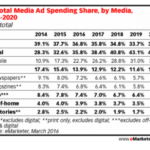What Does The New F.C.C. Ruling Mean For Digital Advertisers?

So what does this mean for digital advertising which relies on this type of information to deliver highly targeted advertising to consumers?
It would appear that the F.C.C. has just made Google and Facebook even stronger. The ruling ONLY applies to Internet Service Providers (Verizon, Comcast, AT&T etc.) not other Internet companies because the F.C.C. has no jurisdiction over these. What the ruling says is that ISPs will now have to obtain consent (opt-in) from a subscriber before using or sharing data with third parties (much as apps do when you download and they ask for your permissions).
This consent will likely take the form of updated privacies policies on their websites and contracts that the user agrees to and in exchange the ISPs will offer some discount or other incentive to get you to voluntarily consent.
Here is what the F.C.C. ruling says is considered sensitive information that ISPs will no longer be able to share with advertisers:
- Precise geo-location
- Children’s information
- Health information
- Financial information
- Social Security numbers
- Web browsing history
- App usage history
- Content of communications
Some ISPs such as Verizon say this ruling doesn’t change much and is consistent with what they already do in obtaining consent from users to track location and browsing history. “We believe that the standards the F.C.C. announed on Thursday are consistent with Verizon’s longstanding privacy practices,” was the quote by Verizon’s Chief Privacy Officer.
Interestingly, a little reported on part of the F.C.C. ruling is that they are still allowing information to be shared that it deems “non-sensitive.” Here is the wording:
“All other individually identifiable customer information — for example, service tier information — is considered non-sensitive and the use of sharing of that information will be subject to opt-out consent, consistent with customer expectations.”
Meaning that while consumers would have to expressly “opt-in” to allow ISPs to share what the F.C.C. labels sensitive information (listed above), ISPs don’t have to get consent to share other types of information they collect unless the user expressly takes the action to inform the ISP that they don’t want them to and they “opt-out.” This will lead to confusion I’m sure about what can and can’t be shared with an advertiser. For example, the ISP can’t tell an advertiser you have children, but could share that you have a large data plan with several lines?
Opponents to this ruling say that now other large Internet companies like Google, Facebook and other ad exchanges that already collect this type of data and sell it to advertisers, have an unfair advantage.
As for tracking people’s location, that isn’t going to end with this F.C.C. ruling against ISPs. Tracking location through a user’s Internet Service Provider is only one of many ways to track location. It’s also tracked by GPS, by apps that you’ve given permission to, your offline purchase behaviors, and of course large internet companies that you sign in to like Google, Facebook, etc.






